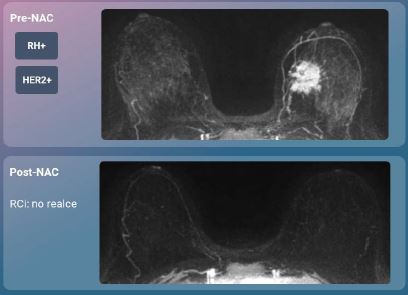UTILIDAD DE LA RM DE MAMA PARA PREDECIR RESPUESTA PATOLÓGICA COMPLETA EN NEOADYUVANCIA EN EL CÁNCER DE MAMA:
ASOCIACIÓN CON SUBTIPO TUMORAL
Palabras clave:
respuesta patológica completa, rPC, poster, seram, cáncer de mama, cáncer de mama, neoadyuvancia, neoadyuvanciaResumen
Objetivos:
La obtención de una respuesta completa patológica (RCp) tras quimioterapia neoadyuvante es un importante factor pronóstico en pacientes con cáncer de mama. El objetivo de este trabajo es valorar la utilidad diagnóstica (validez y seguridad diagnóstica) de la RM para evaluar la pCR tras quimioterapia (QT) neoadyuvante en pacientes con cáncer de mama.
Material y métodos:
Se analizaron de forma retrospectiva los hallazgos de la RM pre y post neoadyuvancia de las pacientes diagnosticadas con cáncer de mama y que recibieron QT neoadyuvante de enero a diciembre 2016 en el Hospital Universitario Doce de Octubre de Madrid.
A todas ellas se les realizó cirugía posterior, que consistió en mastectomía o tumorectomía en función del tamaño tumoral y/o multicentricidad.
Descargas
Citas
Kaufmann M, Hortobagyi GN, Goldhirsch A, et al. Recommendations from an international expert panel on the use of neoadjuvant (primary) systemic treatment of operable breast cancer: an update. J Clin Oncol 2006; 24:1940-9.
Houssami N, Macaskill P, von Minckwitz G, et al. Meta-analysis of the association of breast cancer subtype and pathologic complete response to neoadjuvant chemotherapy. Eur J cancer 2012; 48:3342-54
Von Minckwitz G, Untch M, Blohmer J, et al. Definition and impact of pathologic complete response prognosis after neoadjuvant chemotherapy in various intrinsic breast cancer subtypes. J Clin oncol 2012; 30:1796-804.
Matsuda N, Hayashi N, Ohde S, et al. A nomogram for predicting locoregional recurrence in primary breast cancer patients who received breast-conserving urgery after neoadjuvant chemotherapy. J Surg Oncol 2014; 109:764-9.
Chen JH, Feig B, Agrawal G, et al. MRI evaluation of pathologically complete response and residual tumors in breast cancer after neoadjuvant chemotherapy. Cancer 2008; 112:17-26.
Hayashi Y, Takei H, Nozu S, et al. Analysisof complete response by MRI following neoadjuvant chemotherapy predicts pathological tumor responses differently for
molecular subtypes of breast cancer. Oncol Lett 2013; 5:83-9.
De Los Santos JF, Cantor A, Amos KD, et al. Magnetic resonance imaging as a predictor of pathologic response in patients treated with neoadjuvant systemic treatment for operable breast cancer. Translational Breast Cancer Research Consortium trial 017. Cancer 2013;1 1 9:1776-83.
Fukuda T, Horii R, Gomi N, et al. Accuracy of magnetic resonance imaging for predicting pathological complete response of breast cancer after neoadjuvant chemotherapy: association with breast cancer subtype. Springerplus 2016; 5:152.
Namura M, Tsunoda H, Yagata H, Hayashi N, Yoshida A, Morishita E, Takei J, Suzuki K, Yamauchi H. Discrepancies Between Pathological Tumor Responses and Estimations of Complete Response by Magnetic Resonance Imaging After Neoadjuvant Chemotherapy Difier by Breast Cancer Subtype. Clin Breast Cancer. 2017 Jul 21. pii: SI 526


